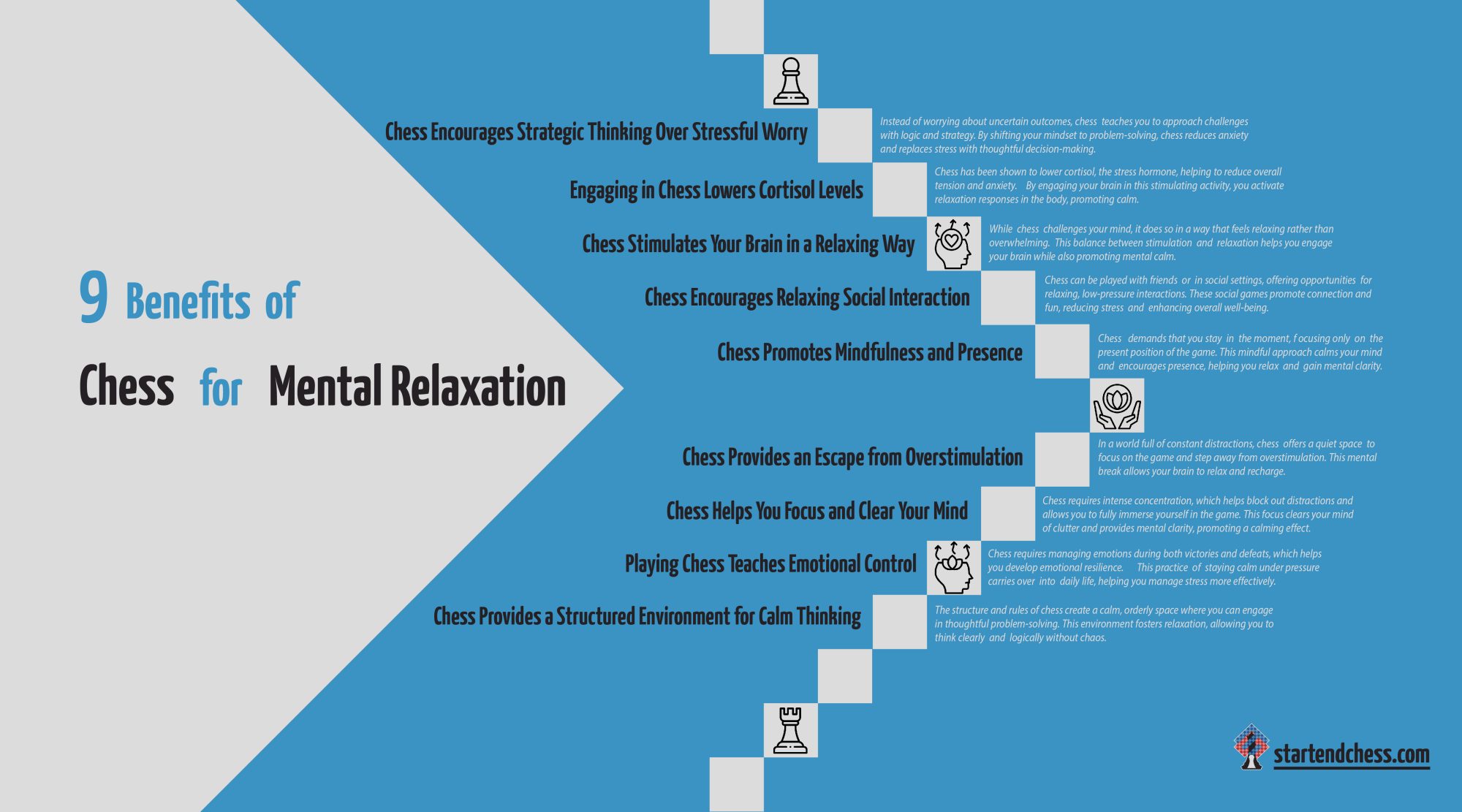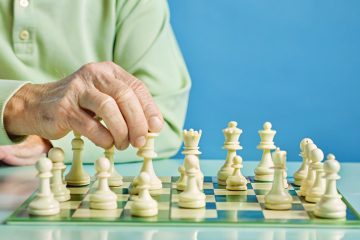9 Remarkable Benefits of Chess for Mental Relaxation
The benefits of chess extend far beyond improving strategic thinking and problem-solving skills. One of the most remarkable advantages of this ancient game is its ability to promote mental relaxation. In today’s fast-paced world, finding ways to de-stress and calm the mind is crucial for overall well-being. Playing chess for mental relaxation not only helps reduce stress and anxiety but also enhances focus, emotional control, and mental clarity. Whether you’re a beginner or a seasoned player, incorporating chess into your routine can provide a peaceful mental escape while sharpening your cognitive abilities.

-
Chess Helps You Focus and Clear Your Mind
One of the greatest advantages chess presents with regard to mental relaxation is a reason in itself-to make you focus. Once you sit down to play, it requires all of your attention. The mental effort that must be put into the analysis of the board, guessing the next moves of your opponent, and strategy building forces you into being in the present moment. That deep focus acts like a meditation where the outside distractions are thrown aside, and the mind clears itself of any stress or anxiety.
The mindset involved in playing, however, relaxes them, and it is what is experienced in mindfulness techniques. It is this focusing on the game that produces a kind of calming effect, the same that is produced during mindfulness practices. The concentration on chess offers a sort of mental “break” from tangles with which daily life entangles their minds, helping to reset their thinking and clear the mind.
-
Chess Encourages Strategic Thinking Over Stressful Worry
The stress in our daily life is very much the result of overthinking or worrying on the outcome that is not within our power. Chess, on the other hand, encourages strategic thinking. When you play chess, you are trained to think logically, evaluate any given situation, and make calculated decisions on what lies in front.
That shift from worry to problem-solving fosters a more productive mindset, reducing feelings of anxiety. Instead of dwelling on what could go wrong, chess teaches you to focus on what you can do next-a mental tension-easer and one that provides a sense of control and calm.
-
Engaging in Chess Lowers Cortisol Levels
Playing chess can directly influence your body’s stress hormones. For instance, it has been proven that mentally stimulating activities, such as chess, reduce cortisol levels, which build up stress in a person. Since the brain is involved with strategic and thoughtful gameplay, the body will automatically lower the levels of stress and generate a sense of well-being mentally.
It could also provide a good avenue to step away from those things that can cause you stress and thus raise cortisol levels in the first place, as you would be settling down and starting to lower your general stress response by focusing on the game.
-
Chess Provides an Escape from Overstimulation
All of us living in today’s world have information piling over our heads-be it from our phones, computers, or just the noise of daily life. That eventually clogs the mind and agitates it. Chess is relief from that chaos. The moment one sits down to play, one slips into a quiet, focused environment where the only thing that counts is your next move.
This is because, as a mental break from overstimulation, your brain becomes relaxed and recovered; you can feel fresher afterward. When you are in the game, you release your mind to head out and reboot.
-
Chess Promotes Mindfulness and Presence
Like meditation, chess encourages you to be in the present moment. You observe your board, your opponent’s move, and the creation of strategy in playing chess without being overrun by what is or what should have been done, whereby thinking too much ahead or dwelling on missed opportunities robs you of your inner peace and keeps you tense.
It quiets the mind, letting you have fewer thoughts of racing and more moments of calm. In so doing, one replicates these skills in real life, ensuring better mental health during daily activities.
-
Chess Provides a Structured Environment for Calm Thinking
Chess-the board, the rules, the strategy-offers an ordering of a world that might otherwise be chaotic. Thus, the rules and objective-driven nature of the game are clear; it creates a tranquil environment in which one can work through matters logically and clearly, bereft of all pressures of unstable circumstance.
The structured thinking frees them from the mental clutter that generally is a part of the feeling of stress. Chess allows the player to take one step back, go to the problems in a methodical manner, and enjoy the satisfying working-out-at of challenges in cool and composed conditions.
-
Chess Stimulates Your Brain in a Relaxing Way
While chess is intellectually arousing, it is yet soothing. The game puts several parts of your brain into play-improving memory, creativity, and problem-solving ability-but without feeling strained. It is this balance between mental stimulation and relaxation that will make chess a great method of engaging one’s mind without adding to the stress one has.
Besides high-pressure tasks at work or daily commitments, chess works one’s brain in a manner quite considered to be enjoyable and relaxing. The mental stimulation is rewarding; the challenge of the game can be satisfying, creating a feeling of calm and contentment.
-
Playing Chess Teaches Emotional Control
Chess players will know how to control their emotions along the process of playing, either excitement because of making an excellent move or frustration in case of an unexpected defeat. Emotional regulation is very important in the mental relaxation of a person. The chess players will learn how to stay calm and composed even during the highly stressing moments. In this way, emotional control among chess players spills over into other areas of life.
The moment you learn how to operate your emotions over the chessboard, you also learn to handle stress and anxiety in real life. This emotional stability enforces mental balance on an individual so that he may remain relaxed even during painful times.
-
Chess Encourages Relaxing Social Interaction
While chess can be played solo, it’s often enjoyed with others. The social component of chess may be through playing with a friend, joining a chess club, or even online places. The meaningful social interactions one gets-especially in a low-stress environment such as a chess game-protect against the decline in mental relaxation and emotional well-being.
All these factors-playing against others, the spirit of healthy competition, the teasing, and the cameraderie-tend to help players enjoy themselves and experience a decrease in stress and tension.

How to Use Chess for Mental Relaxation: Practical Tips
Understanding the benefits of chess for mental relaxation is only the first step—putting them into action is where the real transformation begins. Whether you’re a casual player or someone seeking stress-relief routines, these practical suggestions will help you experience the calming effects of chess more effectively.
Simple Exercises to Experience the Mental Relaxation Benefits of Chess
You don‘t need to be a master or spend hours on the chessboard to to gain the benefits of chess for mental relaxation. The following are simple and useful exercises you can try:
-
Play for 10 Minutes Daily: A short, focused game a day can refresh your mind and improve mental clarity. A few minutes of peaceful play each day can reduce your stress levels and recharge your focus.
-
Play Without Focusing on Winning: Let go of the need to win. Focus on enjoying yourself, thinking about your moves, and observing how your pieces interact. This reduces performance anxiety and enhances relaxation.
-
Use Longer Time Controls: Play games with more time (e.g., 15 minutes per player) to avoid rush. This allows for deeper thinking and staying immersed in the experience, fostering calm and focus.
-
Review Old or Classic Games: Play out old games without the pressure of time. This reflective practice maintains you focused, sharpens your strategic mind, and promotes a more contemplative attitude.
-
Play in a Calm, Peaceful Environment: Set up a quiet, distraction-free setting for your game of chess. This serene setting optimizes relaxation and allows you to fully engage yourself in the game without external distractions.
-
Engage with Chess Puzzles: Test yourself with simple chess puzzles to challenge your brain but make the experience fun and soothing. This intense problem-solving is mentally comforting and accelerates your skills.
How to Integrate Chess into Your Daily Relaxation Routine
To truly gain the benefits of chess for mental relaxation, attempt to incorporate it into your daily routine. Here‘s how:
-
Play Chess Before Bedtime: Rather than watching screens or stressful activities, play a relaxing game of chess prior to sleeping to inform your brain that it is time to sleep well. A relaxing game prior to sleeping can calm your brain and cause good sleep.
-
Pair Chess with Calming Music: Combine your play of chess with some relaxing instrumental music playing in the background. The calming tunes will assist in keeping you focused and calm you down even more as you focus on the game, creating a serene atmosphere that helps with mental clarity.
-
Join a Non-Competitive Community: Search for local or online chess clubs where the emphasis is placed on enjoyment and not competition. Being surrounded by players who enjoy the process of playing the game itself, rather than the outcome, will make for a relaxed and welcoming environment.
-
Write Reflections After Games: Take a minute or two after your chess games to note how you felt while playing—relaxed, concentrated, or clear-headed. This reflective practice enables you to internalize the mental relaxation benefits and reinforce the positive emotional effects of chess playing.
Tools and Resources to Maximize the Benefits of Chess
A comfortable environment and amenities can improve your relaxation experience in playing chess. The following tips will help you to maximize the mental relaxation benefits:
-
Use Minimalist Chess Apps: Opt for distraction-free platforms such as Lichess or Chess.com where you can play a focused, ad-free chess experience. They emphasize the essence of the game so you can stay immersed and relaxed without frustrating distractions.
-
Play Against AI at Moderate Levels: Select difficulty levels that give a comfortable challenge without frustration. Playing at a moderate level with AI can help in practice without causing stress, so you can focus on the strategic side of the game, which results in relaxation of the mind.
-
Use a Physical Chessboard in a Quiet Space: If at all possible, play chess on an actual physical board in a quiet, serene area. The physicality of moving pieces around and the soothing aspect of a quiet area can enhance your mindfulness and concentration, making your game feel more real and relaxing.
-
Read Chess and Mindfulness Books: Read books like The Tao of Chess and Chess for Zen that address the intersection of chess and mental wellness. The books offer informative content on how playing the game calms, makes an individual more conscious, and generally more emotionally sound, hence a greater appreciation for the mental benefits of chess.

Conclusion: Embrace the Mental Relaxation Benefits of Chess
Incorporating chess into your daily routine offers more than just strategic challenges—it provides a powerful tool for mental relaxation. Whether you’re playing to unwind before bed, engaging in a reflective game, or simply enjoying the focused environment it creates, the benefits of chess for mental relaxation are numerous and accessible to all.
By using simple exercises, creating a calm atmosphere, and utilizing the right tools, you can easily experience the benefits of chess—not only sharpening your mind but also promoting relaxation and emotional balance. Remember, it’s not about being a master; it’s about enjoying the journey and finding moments of peace on the chessboard.
What’s your favorite way to incorporate chess into your relaxation routine? Share your thoughts and experiences with us in the comments below!
Recommended Articles:
- The Surprising Benefits of Chess for Hand-Eye Coordination
- 8 Surprising Physical Health Benefits of Chess
- Top 7 Benefits of Chess for Early Childhood Education
- 8 Powerful Social Benefits of Chess: Building Connections and Skills



0 Comments